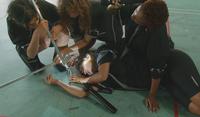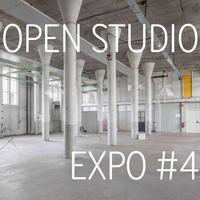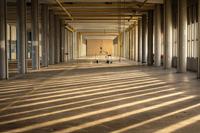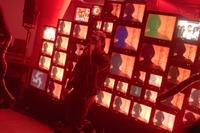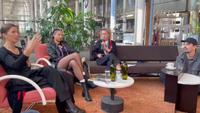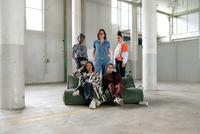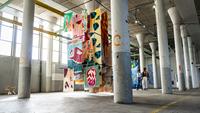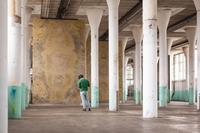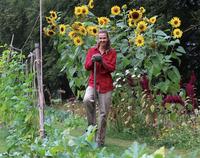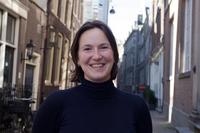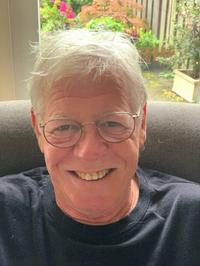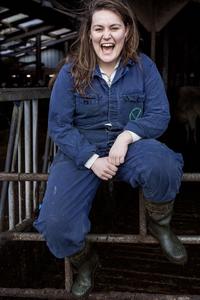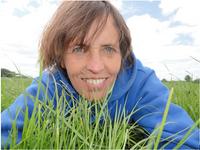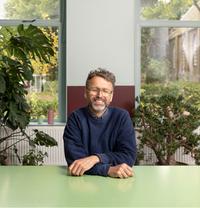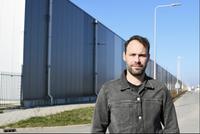These books will be available for you on 21 August:
Klarien Klingen
Klarien Klingen is an agro-ecological farmer and horticulturist at De Wilde Peen, a 'community shared agriculture' initiative, in which citizens can take joint responsibility for nature and their food. One hundred and fifty people eat from their garden. In addition, Klarien has founded Toekomstboeren, a growing movement of farmers who want to do things differently and help each other with advice and assistance. During Wisselgesprek, Klarien talks about the future of farming, the complicated system in which farmers are trapped, and also about her love for what nature can offer us.
Anke Bosma
Anke Bosma is a PhD candidate at the Faculty of Humanities at the University of Amsterdam (UvA), where she is also part of the Rural Imaginations research group. She conducts research into the depiction of the Dutch countryside in film, TV and literature and the alleged divide between the ‘Randstad’, the metropolitan region of the Netherlands, and the rural 'Province'. Her research shows that the portrayal of the countryside in our popular media is often clichéd, either as a backward and irrelevant area, or as a romanticised place where we encounter the 'real' Netherlands. Both clichés ignore the often invisible global economic forces that influence the countryside. What should we be aware of when we think about the countryside according to her?
Bert van de Belt
Bert van de Belt has been an activist since the late 1980s, and in this time has only become more concerned about the future. He is especially worried about the effects of climate change which he observes both on the news as well as in his immediate environment. He recently joined the Zaandam branch of the worldwide Extinction Rebellion movement. During Wisselgesprek, he will elaborate on his own experiences as an activist and on how it feels to take personal responsibility and show commitment to your ideals. He will also talk about Extinction Rebellion more generally, what they do, what actions they take and with what results.
Amber Laan
Amber Laan is a dairy farmer and an advisor in sustainable agriculture at Schuttelaar en Partners. After obtaining her Master's degree in Management and Policy, she joined the partnership in which she milks 70 cows with her parents and sister in Warder, North Holland. By combining dairy farming with consultancy work, she works on connecting policy and practice with regards to making agriculture more sustainable. As chairman of the Hollands Agrarisch Jongeren Kontakt (Dutch Agricultural Youth Contact, HAJK) she represents the voices of young farmers and creative entrepreneurs. During Wisselgesprek, she tells you what she thinks a future-proof agricultural sector would look like.
Merten Nefs
Merten Nefs grew up in a polder landscape in Zeeland on the Westerschelde, near the farmlands and fruit growers, where also the potato and canning factories were located, and where container ships sailed by in the background - all elements of what we now call the 'agro-logistics complex'. Merten became an architect and worked for five years in São Paulo, where he became fascinated by the continuous supply of goods to mega cities. He is currently conducting PhD research ('Landscapes of Trade - the countryside as hinterland') into the spatial impact of logistics in the hinterland (backcountry) of the port of Rotterdam, an area that extends to the German border and where the multiplication of warehouse-shaped buildings in the landscape is increasingly affecting local politics. Do you ever order a package?
Eline van de Veen
Born and raised in the countryside, Eline van de Veen helps farmers, entrepreneurs and (future) residents realise their social and landscape restoration initatives through her own company Zin in Buiten. If you dream of leaving the city behind, Eline's story during Wisselgesprek a must-hear. Her statement reads: “Rural life is a verb. You cannot passively consume rural life. Living in the countryside is the result of your care for the land and nature”. For new residents, this does only means beautiful nostalgic living, but also an active commitment to achieving healthy soil, clean water or the replanting of trees and shrubs.
Erik Wong
Fifteen years ago Erik Wong exchanged Amsterdam for Hornhuizen, a tiny village on the coast of Groningen. In the empty village pub he started a 'a communual working space/meeting floor' and called it Wongema, a localised version of his own last name. Wongema grew into a place where the hyper-local and the suburban collide permanently. In Radio Wongema, among others, these meetings - under the motto 'everything is important' - took shape in one-on-one conversations and live shows. Erik has now handed over Wongema to a new generation of innkeepers and returned to 'the city' where he writes, creates podcasts and teaches. He can hardly let go of Hornhuizen. He writes a column in the local newspaper about the worries of a man who leaves his village. But… does the village ever leave the man?
